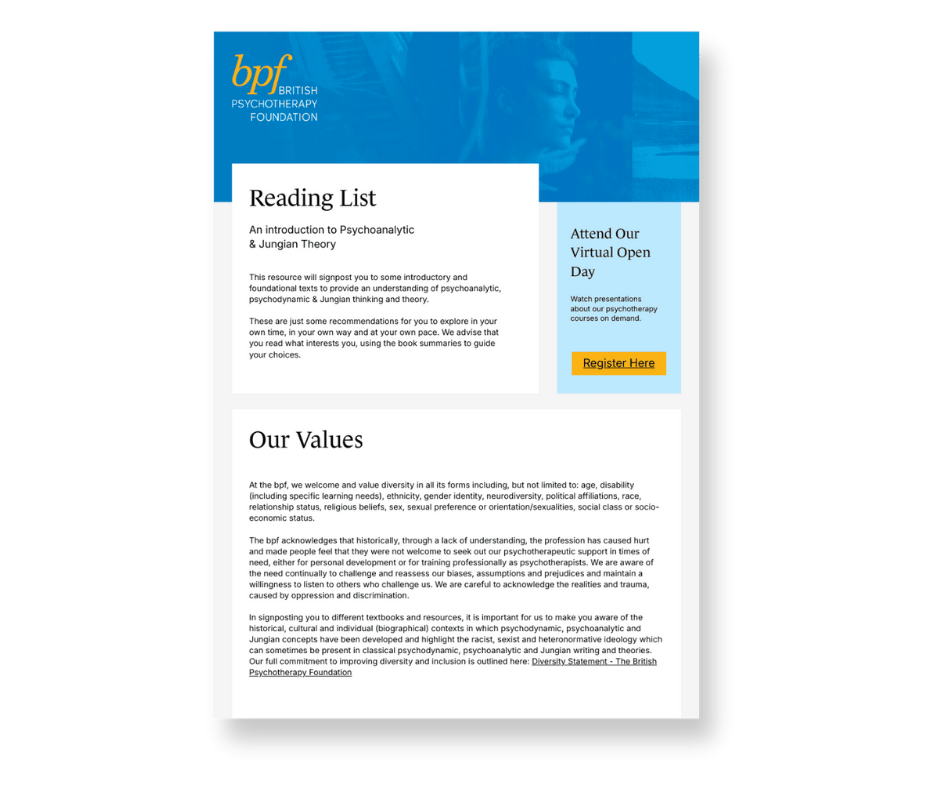
Psychotherapy Training
Accredited by the British Psychoanalytic Council (BPC) and the Association of Child Psychotherapists (ACP), the bpf provides training in psychotherapy for every level of learner. The bpf is based in London (Kilburn) and Newcastle upon Tyne; however, some of our courses can be studied online or in a hybrid format.
Skills for every journey
From the complete beginner, to the highly experienced psychotherapist, our courses support individuals at every stage of their learning journey.
Our team of teaching staff is made up of professional psychotherapists from Jungian, psychoanalytic and child and adolescent psychotherapy disciplines.
Make a £10 Donation – Receive a Reading List
Donating supports our mission to make our psychotherapy training, clinical services, and public events affordable, accessible, and more inclusive.
Reading List: Introduction to Psychoanalytic & Jungian Theory
Receive a curated list of 67 essential texts – covering psychoanalytic, psychodynamic, and Jungian theory – ideal for both newcomers and those wanting to deepen their knowledge.

Pre-qualification & Foundation Courses
8 courses
Courses to introduce you to counselling and psychotherapy theory and practice.

Qualifying Training
11 courses
Professional psychotherapy qualifications to prepare for a career in psychotherapy.

Post-qualification
9 courses
Specialist training to enhance professional skills.

Accredited degrees
4 courses
Academic qualifications to develop knowledge through research and training.

Professional Development
9 courses
Learn new skills.

New Courses
- Awakening the Inner World: An Experiential Weekend for Beginners – (Taught in London, 5th–6th & 26th–27th September, 2026)
- Intensive Summer School: Foundations of Psychoanalytic & Jungian Psychotherapy – (Taught Online, Thursday 16th to Monday 20th July, 2026)
- Reading Group – Psychoanalytic Psychotherapy Association – (Taught Online, Rolling Entry)
- Psychodynamic and Jungian Theory for Qualified Practitioners (Taught Online, September 2026)
bpf North:
- Foundation Course (Taught in Newcastle, October 2026)
- Psychoanalytic & Psychodynamic Psychotherapy Training (Taught in Newcastle & Online, October 2026)
Upcoming Events:
- 31st January, 2026 – Barbara Dockar-Drysdale One-Day Conference (Public Registration Page) – Time: 10:00 – 14:45. Venue: Hybrid event – BPF Mapesbury Rd & Online via Zoom. Price: Public admission fee (In Person) £35, Public admission fee (Online) £25.

Make a £10 Donation – Receive a Psychoanalytic Reading List
Donating supports our mission to make our psychotherapy training, clinical services, and public events affordable, accessible, and more inclusive.
Reading List: Introduction to Psychoanalytic & Jungian Theory
Receive a curated list of 67 essential texts – covering psychoanalytic, psychodynamic, and Jungian theory – ideal for both newcomers and those wanting to deepen their knowledge.
Develop with us.
We are renowned for providing rigorous and intensive psychotherapy training, taught to the standards of the British Psychoanalytic Council (BPC) and the Association of Child Psychotherapists (ACP).
We also understand that training can be an emotionally challenging process and pride ourselves on the extensive support and guidance we offer all our students.
With over 750 bpf members, those who study with us have the unique opportunity to join a lively community of professional psychotherapists and trainees from across the UK. Students also gain access to a busy schedule of networking and CPD events, as well as opportunities to get involved in the latest research.

